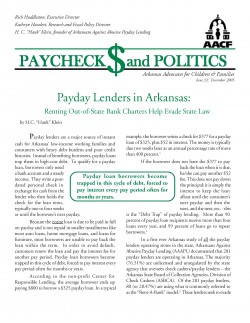
Payday lenders are a major source of instant cash for Arkansas’ low-income working families and consumers with heavy debt burdens and poor credit histories. Instead of benefiting borrowers, payday loans trap them in high-cost debt. To qualify for a payday loan, borrowers only need a bank account and a steady income. They write a post-dated personal check in exchange for cash from the lender who then holds the check for the loan term, typically one to four weeks or until the borrower’s next payday. Because the entire loan is due to be paid in full on payday and is not repaid in smaller installments like most auto loans, home mortgage loans, and loans for furniture, most borrowers are unable to pay back the loan within the term. In order to avoid default, customers renew the loan and pay the interest fee for another pay period. Payday loan borrowers become trapped in this cycle of debt, forced to pay interest every pay period often for months or years.
According to the non-profit Center for Responsible Lending, the average borrower ends up paying $800 to borrow a $325 payday loan. In a typical example, the borrower writes a check for $377 for a payday loan of $325, plus $52 in interest. The money is typically due two weeks later at an annual percentage rate of more than 400 percent.
If the borrower does not have the $377 to pay back the loan when it is due, he/she can pay another $52 fee. This does not pay down the principal; it is simply the interest to keep the loan afloat until the consumer’s next payday and then the next, and the next, etc. – this is the “Debt Trap” of payday lending. More than 90 percent of payday loan recipients receive more than four loans every year, and 99 percent of loans go to repeat borrowers.
